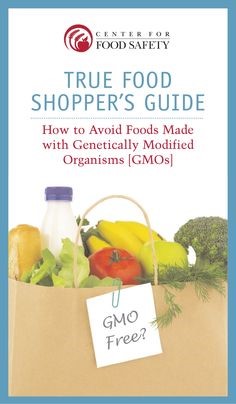The Tool for Your Shopping Convenience!
Well, outside of Cook'n 11 and 12, that is. I'm talking about a guide you can take to the store that removes the confusion and mystery around which foods are GMOs and which are not.

The True Food Shopper's Guide: How to Avoid Foods Made with Genetically Modified Food Organisms (GMOs) was created by the Center for Food Safety (CFFS). This organization works to protect human health and the environment by curbing the proliferation of harmful food production technologies and by promoting organic and other forms of sustainable agriculture.
This FREE download lists hundreds of foods that are and are not genetically modified. This is an amazing piece of work since we have no real labeling restrictions regarding GMOs in the food industry right now. So to have this information at our fingertips is wonderful. Take a look at the Table of Contents:
Fruits & Vegetables
Fish
Eggs
Meats & Alternative Meat Products
Dairy Products
Alternative Dairy Products
Baby Foods & Infant Formula
Baked Goods
Cereals & Breakfast Bars
Energy Bars
Grains, Beans & Pasta
Canned Foods
Soups & Sauces
Frozen Foods
Condiments, Oils, Dressings & Spreads
Snack Foods
Sweeteners
Candy, Chocolate Products
Sodas, Juices & Other Beverages

If you're not interested in this issue, or feel it's no big deal, consider what the introduction to this important information says: "Genetic Engineering (GE) or Genetic Modification (GM) of food involves the laboratory process of artificially inserting genes into the DNA of food crops or animals. The result is called a genetically modified organism or GMO. GMOs can be engineered with genes from bacteria, viruses, insects, animals, or even humans. Most Americans say they would not eat GMOs if labeled, but unlike most other industrialized countries, the U.S. does not require labeling. This Non-GMO Shopping Guide is designed to help reclaim your right to know about the foods you are buying, and help you find and avoid GMO foods and ingredients."

Before launching into the helpful lists, True Food Shopper's Guide explains "the Big Four." These are the most common genetically engineered foods found in processed foods:
CORN, found in:
· Corn flour, meal, oil, starch, gluten, and syrup
· Sweeteners such as fructose, dextrose, and glucose
- Modified food starch
SOY, found in:
· Soy flour, lecithin, protein, isolate, and isoflavones
- Vegetable oil and vegetable protein (TVP)
CANOLA OIL (also called rapeseed oil)
COTTONSEED OIL
And additionally, genetically modified (GM) sugar beet sugar recently entered the food supply. With this in mind, you'll want to look for organic and non-GMO sweeteners, candy and
chocolate products made with 100% cane sugar, evaporated cane juice, agave, or organic sugar, to avoid GM beet sugar.
If this information is something you want on hand, then go to https://www.centerforfoodsafety.org/fact-sheets/1974/true-food-shoppers-guide-to-avoiding-gmos. You can
· download the Shoppers Guide as a PDF
- get the iPhone app for iPhone or iPad
- get the Android app
- browse the Shoppers Guide online
- Or you can email us at office@centerforfoodsafety.org to order a printed pocket Guide

This issue is becoming a big deal, so let's keep this Guide with us whenever we shop. We can store it inside our reusable shopping bag, put it into our coupon holder or check book, or leave it in our car. It's wonderful to have this information-it's THE tool for our shopping convenience! (Well, outside of Cook'n 11 and 12, that is.)
- www.centerforfoodsafety.org
- www.pinterest.com
 Alice Osborne
Alice Osborne
Weekly Newsletter Contributor since 2006
Email the author! alice@dvo.com
